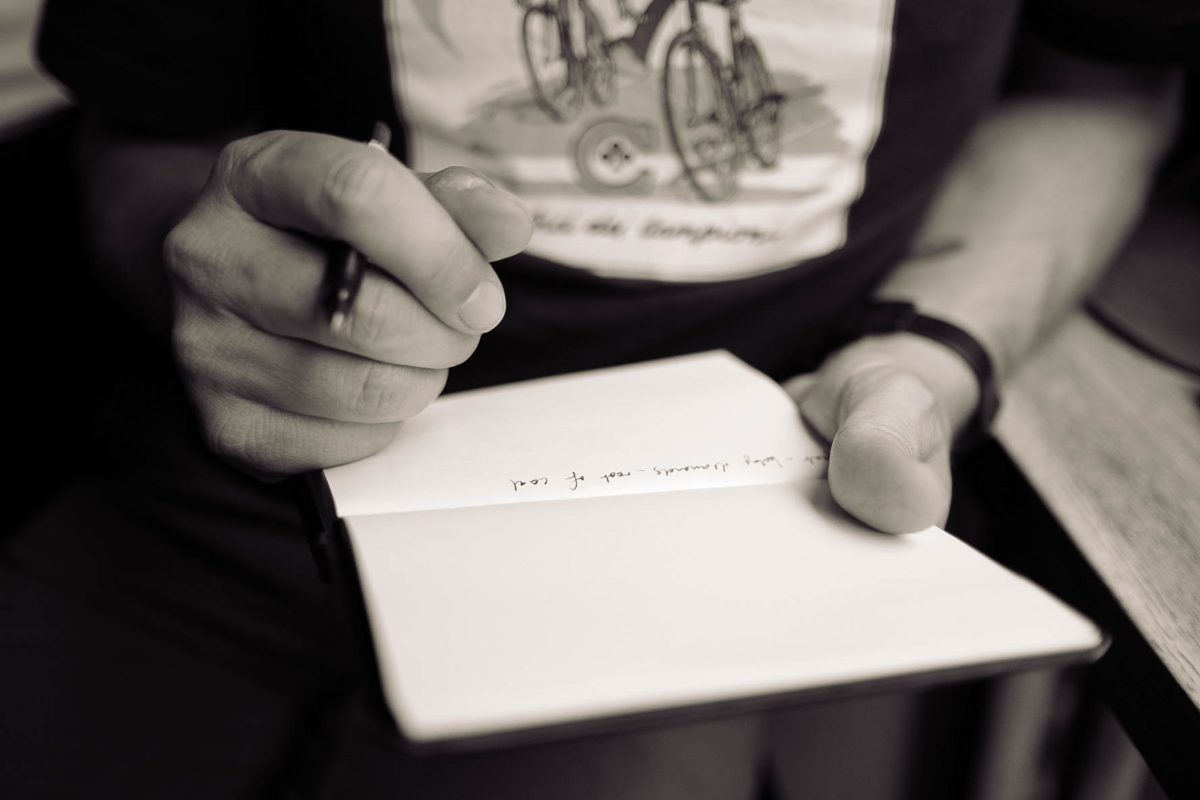Writers, get physical focus and improve how you interact outside your head when you are writing. With just a few simple changes you can actually support the focus in your head with things outside your head. All we need do to is make a few changes we do outside our heads. So let’s look at how we can do that.
Get some real paper
Sure everyone loves their computers. I would not be able to work without one neither would most writers. They have their purposes, but when it comes to getting our ideas crystal clear in our heads, you need to get focus. There are times when we need to focus our minds most. It is then that paper that rules. Why? Because paper is something physical you can touch. We learn by touch. Touching something like pen and paper, changes the way we thing and allows a deeper focus.
I use both my computer and paper in my work. I’ve found that I get a better flow from the start if I do a little of the planning and sweep my mental decks a bit with paper and pen. I also get a better rough draft if I write longhand at times then transcribe for the edits and rewrites. It depends on the project.
Clear the mental deck
I like to clear my mental decks every morning by free writing three pages by hand. Getting all the mental junk and any of the negative emotions out of my head allows me to uncluttered my thinking for the rest of my writing. It also seems to have a carry over for the rest of the day. I do seem to think better when I freewrite in the mornings. While freewriting I may write on anything but my work or I might find an idea for my book or blog.
It does not matter. I am focusing my mind to the work that is coming along. I’m grateful that so many writers, thinkers and artists that passed on the wisdom to use pen and paper first to me. I have seen variations of it from Steve Jobs on thinking clean to Julia Cameron (Moring Pages) to Pamela Hodges who teaches that doodling is a great way to kill writer’s block.
Set your deadlines
Deadlines are a fact of life for a writer. Neither your love or your hate matter to your deadline. Deadlines are a fact if you are going to be productive, much more so if you have bills to pay and a need for food. The only choice is which kind of misery does one choose, to have nothing done or plain productive misery?
Deadline positive
You can use deadlines to your advantage. Sure you still need your weekly and monthly deadlines for projects, but they are useful in other places too. A deadline can be a set for shorter periods to increase productivity and decrease drudgery by setting a target for how much work you need done before lunch. You can use them in micro writing sprints of five minutes. Word counts can even be tracked to see how much better you are getting over time or as a target to hit consistently for a week or month as a challenge.
When we set deadlines we focus better because we know exactly what we will do before we even sit down. When I make my deadlines I feel more confident and know that I am improving my skills.
Set your pattern
Humans are creatures of habit. Without a good series of habits, a pattern, in our lives we tend to rely on our feelings to guide how we get things done. When we harness hour habits into a repeatable daily work pattern we harness the control mechanism of our days. A solid working pattern will make you more consistent and focused in your practice.
It is not even just our writing pattern that matters. How we lead the rest of our lives matters as well. For instance there is a study that shows how many famous writers’ sleep habits gave them more focus and made them more productive. In the end consistency is one of the keys to success in writing and life. An effective plan just makes a lot of sense.
Set your place
This idea is both simple and complex. You need to know where you can write. Just as no two writers are exactly alike, so too no two places are going to be as effective for you.
For me, I have tried to write in many places from buses to restaurants. Most of them never worked too well. Some worked really well. The breakthrough for me was when I found that I preferred the more silent and emptier places, like large spaces in old libraries and espresso shops when the customer traffic was low. I also adapted. When I first had kids they made such a fuss that I could not think, but these days I can hear two teens bickering and just blow them off. I still cannot do this outside of my own house though.
The key is to be on the lookout for places where your production is high. A friend of mine swears by crowded buses and large scale sporting events. For him he needs the energy of the crowd to lock down.
Mindset
A little meditation
Now how about when we become distracted and lose our focus? Is the day lost or can we reclaim it? For that we have meditation. Not the spiritual kind. The best meditation for a writer comes from those times we need to calm the mind down so we can concentrate. Focusing on our breathing is just the right tool for the job. It works too.
Here are the guidelines:
Set your timer for 10 minutes. That’s all the time you need. The timer removes worry over the time and lost focus.
Keep pen and paper at hand in case you have an insight you want to remember.
Get comfortable. Choose a seated position that works for you, just do not choose one that relaxes you so much that you go to sleep. Sitting cross-legged or any other position that puts your feet closer to your buttocks is great. The more compact our legs are to the heart, the easier it is for the heart to work. Less stress means more concentration.
Close your eyes. Become aware of your breath. Feel the body’s tension as you inhale and exhale, place your focus on the exhale and relax consciously as the air leaves the body.
Next move your awareness to your nose. Feel the air enter and leave through the nose.
Keep your mind focused on the air entering and leaving through the nose. Just observe the flow. When you catch yourself wandering from watching the breath, just move your thoughts back to the breath and observing the feeling in the nose.
It’s not uncommon to be unable to focus on the nose in the beginning. Just count the breaths one to ten then start back at one. If you miss or lose count, just start with one.
Continue to count and watch the breath till the timer goes off.
Getting in your head
Talk to a specific person.
It’s easier to talk to a friend or someone you know. So use your imagination and pretend you are talking to them while you are writing. Ask yourself, “What can I say to Bill about this topic or book chapter?”
Notice tightness when you start to write.
That tightness is tension. You don’t want to write and would rather do something else. Recognize it and let the tightness go. Relax. Enjoy your work.
Watch for the urge to do something else.
Watch only. Do not act on the impulse, instead let it come and then go away. Then back to work.
Bonus observation:
Relax and enjoy the work itself.
Do the work for the work itself. Not for the money or the productivity or anything else. The work is its own reward. Viewing your work in this way allows you to set up a biofeedback loop that revitalizes you for just having done the day’s work. This is the same kind of loop that a daily swimmer or runner gets when they hit the laps or run first thing in the morning. They may start out feeling lousy and out of sorts, but by the end they are back in sync with themselves and the world.
Acts create perfection
Last piece of advice comes from Margaret Atwood. “If I waited for perfection, I would never write a word.”
Physical focus is a great tool, especially when you have that long project you want to finish. Here’s an article to help. Finish Your Long Project In 11 Steps
Photo by Joshua Gresham on Unsplash









